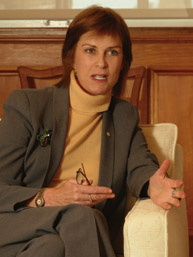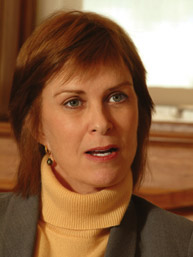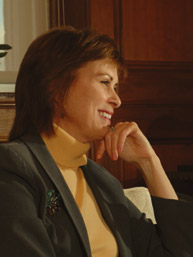In the News: Heather Munroe-Blum
In the News: Heather Munroe-Blum McGill University
User Tools (skip):
Meet the Principal

Nicolas Morin
She may be the busiest woman in Montreal. McGill Principal Heather Munroe-Blum says she is a high-energy person who needs little sleep -- a good thing, because she can't be getting much shut-eye these days.
Since her arrival at McGill in January 2003 and her official installation two months later, she has been busy with activities ranging from a Quebec government commission on the funding, quality and accessibility of post-secondary education, alumni events and on-campus town halls to a snowshoe race on Mount Royal and the Olympic torch relay. She has been getting to know McGill students, even appearing at a student pub held in a tent on a frigid January evening, much to the surprise of partygoers. And, of course, she participates in convocations, chairs discussions in Senate, reports to McGill's Board of Governors on University issues and greets hundreds of graduates at Homecoming.
But the bulk of her time has been spent getting to know McGill, burrowing to the heart of the University, discovering its culture and understanding what faculty, staff, students, alumni and friends hold dear and hope for its future. It's all part of an intensive campus-wide exercise she has initiated with the Provost, vice-principals and deans to develop a strategic plan for the University, identifying areas where McGill should build on its strengths and setting ambitious new goals in burgeoning fields like nanotechnology, genomics and the study of international conflict.
University governance is nothing new to Munroe-Blum. Before taking over top spot at McGill, she was Vice-President, Research and International Relations, at the University of Toronto for eight years. A respected researcher herself, she helped double the funding support for U of T's research programs. In 2003 she was awarded the Order of Canada and cited as one of the country's "most influential spokespersons for universities in matters of research strategy and policy." Munroe-Blum slowed down long enough to talk to the News recently.
Could you tell us a little about your family background?
My parents are both from Montreal, and my oldest brother and I were born here. Although I grew up in Toronto and Hamilton, my grandparents, aunts, uncles and cousins were here, so there's a strong Quebec base to our family. I have five brothers and, as the second eldest in the family, I played a semi-parental role. Now when people say to me, "Gee, you have to work so much with men in industry or in government," or when individual men are interacting with me and being overly tough-minded, this is all very familiar. For me the defining features of growing up and helping siblings grow up in a very rambunctious family are that life is about the collectivity -- we're in this together -- and how we make the best of things together. Whether it's in a family or in a community like our McGill community, there's a sense of rallying around our common purpose and a set of high aspirations. I get that from my family.
Is it true your mother won a scholarship to McGill?
She did, but her father, who was an Irish immigrant bus driver in Montreal, thought a girl shouldn't go to university, so she missed the opportunity. She was incredibly bright and she suffered because of that, so she really wanted her children to grow up with a sense of equal opportunity. Ours was a very literate household and not a day went by that our house wasn't full of debates and value discussions. Our parents treated us as peers from day one, which can be good and bad, but it meant you had to think about what you believed in and you had to learn to make a case for it. All that has served me well. I developed a sense of social justice and the understanding that not everyone else thinks and feels the way you do, that not everyone else has come to life with the same set of experiences and perceptions.
You contracted polio as a young child. How did that experience shape your approach to life?
I went into hospital on my third birthday and was supported by an iron lung for a long time. My mother was told I'd never walk again and they worried about whether I'd survive at one point. You don't know exactly how those things early in life affect you, but I'm a very determined person and no doubt this experience contributed. I went through very intensive rehab and recovery. There was an extraordinary volunteer who had me go live with her for a period and she did very active physiotherapy. She was a retired British physio who believed that bedrest was the wrong approach at a time when bedrest was the prescribed treatment. So there was the sense around me not to accept defeat and no matter what's happened, I've always felt lucky and I've always felt optimistic.

Nicolas Morin
Did those lively debates and discussions at home lead you to academics as a career?
There was never any question for me of not going to university. My older brother led the way -- he went off to Osgoode law school and I went to McMaster. I think the polio experience took me into my first profession, which was social work, because coming from the economic background I did, if you thought about service, social work was the way you'd think about it. When I got into the field and started to ask questions about whether what we do makes a difference, the possibility arose of moving into science and research, into epidemiology. I had the blessing of being at that time at the new McMaster medical school as a young social worker where it was very interdisciplinary. That was the philosophy of the medical school and so with a sociology and social work background, I was lecturing in the medical school as a 25-year-old in this wonderful environment and seeing different disciplinary points of view come together. None of it was planned, but when I look back, every chapter helped to prepare me for some dimension of what I'm doing today.
You're a believer in the interdisciplinary approach?
Absolutely. This has always been part of the character and culture of McGill. And it's one of the things that has made us strong in spite of underfunding. I'd say the other part of the culture that so resonates for me, my personality and my past is the sense of commonality, of deep dedication to the institution and the community. I've never actually seen such a talented group of people who care as much, not just about themselves -- thinking "it's not just about me and my program, it's about McGill and what can I do for McGill," and that's fantastic.
What are your priorities for McGill?
Quality. Quality in our teaching, our research and the services that we provide to our students, our faculty, our alumni. We should be able to rank in the top ten of public universities in the world over the next decade. I believe we can do that. We've got to be focused and disciplined and, as well, expand our resource base dramatically to do it. We are a lean, mean machine. When you look at what we achieve and the funding levels that we've got, it's a remarkable record of success. There's no better investment in the world than an investment in McGill. There's no better deal in the world than coming to be a student at McGill.

Nicolas Morin
Where does McGill need to improve to get to that level?
We need a much more substantial base of funding for undergraduate student aid and full graduate fellowships. And we need to improve student services. There's not a dean in the University who wouldn't like to provide more advising to students than we do currently. Every student ought to graduate with several people who know them well and can write letters of reference for them. We must do everything we can to ensure that our students receive the support they deserve to achieve their full potential, to get the maximum from their experience here.
We also need to continue to attract and retain outstanding people -- talented and creative people who are committed to academic excellence, teaching and innovation. The competition is increasingly intense for the best professors, students, and staff, for superb ideas, high-impact innovations and for investment.
In our academic planning, we are building a clear vision of McGill's intellectual and academic leadership. This vision requires world-class infrastructure to support world-class personnel and there are areas where we need to renew our infrastructure. The new Arts Building and the new allied health sciences building are high priorities for us, as is renovating some of our heritage buildings.
We need to develop further a critical mass of excellence, and we are doing that. McGill has hired over 100 new professors in each of the last four years, and we will hire 100 more every year until the end of the decade. This is an unprecedented period of academic renewal in our history. It must be done right and it must be done without compromise.
Excellence must be surrounded by excellence. And there must be creative interplay. We must aim higher in our search for knowledge and for practical solutions to the problems facing society. Research is vitally important at McGill. Ambitious research attracts the most talented professors, and the most promising students. Research results in knowledge, and solutions. It is about pushing the limits of our imagination in every direction -- it requires diligence, it requires funding, and it flourishes in a culture of optimism and excellence.
What would you hope that graduates of McGill come away with?
I would hope that their experiences at McGill have given them not only an excellent education, but have helped them develop life skills and shape their values and principles, as well as their own sense of citizenship and commitment to community.
I want them to have had professors who've marked their lives in positive ways. I want them to have a network of peers from around the world who will be lifelong friends and contacts for them. I want them to stay connected to McGill and see us as a resource in the future, and I want them to feel that they're ambassadors for the University, and that they also feel a strong desire to come back to McGill over their lifetime.
You've met with alumni in many parts of the world. What have you learned from them?
That they have a special place in their hearts for McGill. They almost to a person have loved their time here. There's a very strong sense of a Canadian institution that has an international reputation and is a wonderful asset.
A very strong message we hear from alumni is that "our alma mater's important to us because you are our intellectual centre -- we came to learn from you, and we want to keep learning from you." At Homecoming weekend, for example, there was a panel on genetically modified food, and it was wonderful, the place was packed, and stories were told that you'd never think about, about what's good and where positive things have been achieved with genetically modified foods.
The huge success of Mini-Med (lectures for the public on medical topics) also shows a real appetite for this kind of learning. My husband's taking it right now, and he won't skip his Mini-Med class -- he just loves it.
You and other university leaders have lobbied Quebec for increased support for the province's universities. Do you think the government will change its policy and allow tuition to rise?
The real question is, how do we fix the underfunding? The Quebec government must decide on the appropriate balance between base funding and tuition fees to ensure that universities are adequately funded. That is not the case now. I'm confident there will be change, and I think it will reflect a better balance for those students who can afford to pay more for their education paying more. But we absolutely should not increase tuition without a corresponding increase in student aid for those students who need it. It's a question of what framework will achieve optimal accessibility, quality and degree completion. That's important in Quebec, where we are below the average in Canada on participation and below the average in Canada on degree completion, which is not serving Quebec well.
If you had to write a job description for your position, what qualities would you put at the top?
You have to love the life, you have to love the place and you have to love the people -- you are with a lot of people in the course of a day. There are roughly 40,000 people in our immediate community, and then of course the broader world around us of alumni and partners. And finally, I guess you have to be very committed to the notion of a team. That's easy here, because there is such a collective spirit.
My greatest frustration in the job is not being able to do all the things I would like to do. I'd like to be at a class every week, I'd like to be out there more around the University. I have breakfasts and lunches and teas with students and faculty members and I love all of it. I just wish I could do more.
Has anything about McGill surprised you?
As good as I thought it would be, nothing prepared me for the quality of the students, faculty and staff. I've been associated with six universities in my life and the loyalty and sense of institutional commitment at McGill are really quite extraordinary. These things are rare and, again, when you think about the backdrop against which this has been achieved, I look to our predecessors with enormous admiration and gratitude.
Do you have time to relax or enjoy any hobbies?
I love my work and spending time with my family. I enjoy walking and hiking, and I try to do that on weekends. Also, I aim to do 30 minutes of yoga in the morning, but it would be a big fib to say that I have a hobby in the traditional sense.
Is there anything you'd like to add?
Maybe just how wonderful it is living in Quebec. My husband and I have a wonderful sense of being at home. It reflects how generous and warm people have been across the board. But there is also a sense of the diversity here, the commitment to quality of life, the social values that underpin society. That of course is part of the character and fabric of McGill, but it's also very much part of the character and fabric of Quebec. I've been able to live in a lot of places, but I've never been in a place that's as integrated in terms of different occupations, different social groups, different economic groups coming together, and that's a lovely feature of this society.
For more on Principal Munroe-Blum's academic background, see www.mcgill.ca/principal/munroe-blum/.


